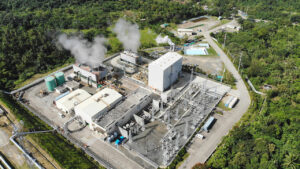STATE-RUN Power Sector Assets and Liabilities Management Corp. (PSALM) has completed the sale of three lots of its Maibarara property in Batangas and Laguna to Maibarara Geothermal, Inc. (MGI) for P473.17 million.
In a statement over the weekend, PSALM said that MGI was the sole bidder to submit a minimum bid price.
“The bid was conditionally accepted, pending the completion of the post-qualification process,” PSALM said, adding that it would verify the accuracy and authenticity of the eligibility documents submitted by MGI.
MGI is a joint venture of PetroGreen Energy Corp. (65%), PHINMA Energy (25%), and PNOC Renewable Corp. (10%). It is the developer and operator of the 20-megawatt (MW) Maibarara-1 and 12-MW Maibarara-2 Geothermal Power Projects in Sto. Tomas, Batangas.
Maria Carmela D. Hautea, corporate secretary at MGI, said that the two lots were used as steamfield and access road, which are already under an existing lease agreement with PSALM.
“We submitted a bid to acquire these lots, including another lot for our outfield reinjection. The award to MGI followed after two earlier failed bidding attempts by PSALM,” Ms. Hautea said.
The three lots have an aggregated area of 58,911 square meters, more or less, and are located in San Rafael, Sto. Tomas, Batangas, and Calamba, Laguna.
According to PSALM’s bidding procedures, Lot No. 5255-B (Lot B) and Lot No. 5253-A are covered by a land lease agreement among National Power Corp. (NPC), PSALM, and MGI for 25 years, starting May 2, 2012, and expiring on May 2, 2027.
Lot No. 4256-A, on the other hand, is covered by a land lease agreement between PSALM and MGI for one year, commencing on April 15, 2024, and expiring on April 14, 2025.
PSALM stated that the land lease agreements did not restrict its rights to sell the subject lots to a third party, but the buyer must respect and protect the leasehold rights of MGI over the properties.
“The proceeds from the successful privatization of any PSALM asset will be used to settle the remaining stranded contract costs and stranded debts that PSALM assumed from the National Power Corporation,” the company said.
PSALM was created under Republic Act No. 9136, or the Electric Power Industry Reform Act of 2001, to lead the privatization of NPC generation assets, liabilities, independent power producer contracts, real estate assets, and other disposable assets. Its corporate life is set to expire in June 2026, or 25 years after the effectivity of the Electric Power Industry Reform Act. Should PSALM be dissolved, all of its assets and liabilities will revert to the National Government. — Sheldeen Joy Talavera


















